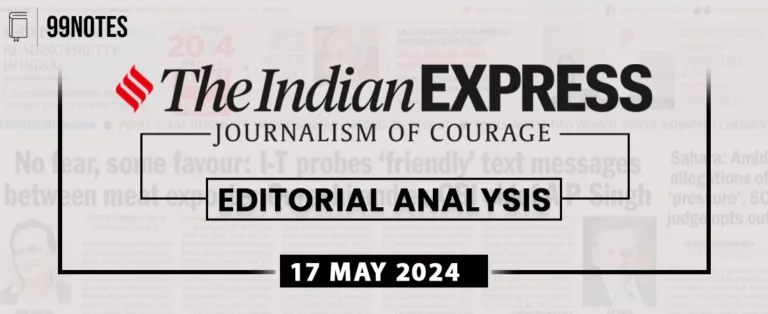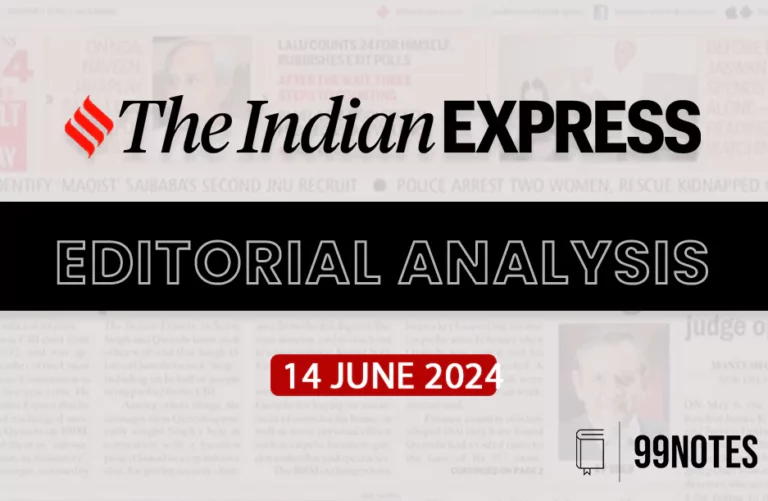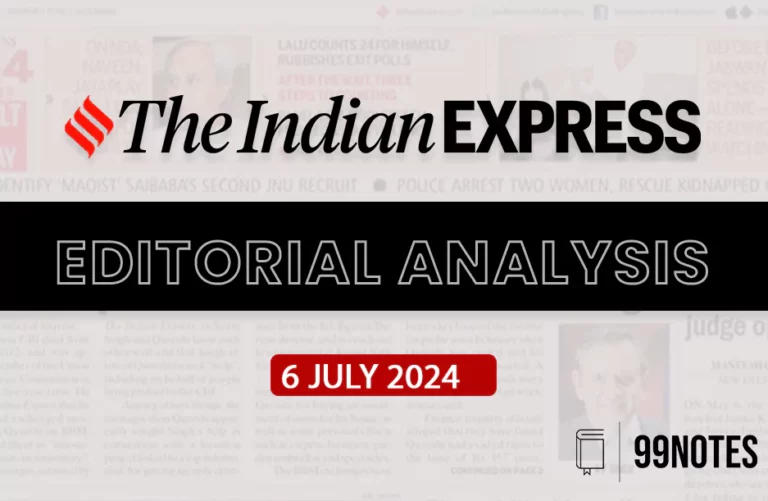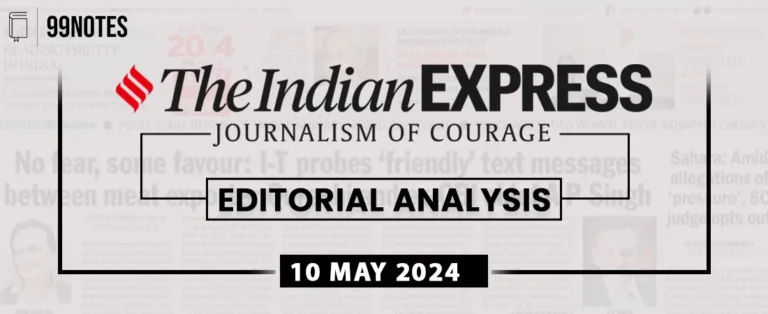26 March 2024 : Indian Express Editorial Analysis
Indian Express Editorial Analysis
26-March-2024
1. WTO’S EXISTENTIAL CRISIS
|
Topic: GS2 – International Relations – Agreements involving India or affecting India’s interests. This topic is relevant for both Prelims and Mains in the context of knowing facts about the WTO ministerial meeting which sheds light on the complexities of international trade negotiations, trade agreements, and the challenges faced by member countries in reconciling national interests with global trade rules. |
|
Context: |
|
Public Stockholding Program (PSH):
- One of the central issues debated was the public stockholding (PSH) program, concerning the right of countries to purchase, stockpile, and distribute food to their citizens in need.
- While this is a sovereign right, WTO rules, particularly regarding trade-distorting domestic subsidies, create obstacles.
- The outdated assessment criteria for subsidies, based on prices from the 1980s, complicates matters, especially for countries like India relying on MSP for their PSH programs.
Subsidies for Industrial Shipping Fleets:
- Another significant issue was regulating subsidies given by industrialized nations to their industrial shipping fleets, contributing to overcapacity and over-fishing (OCOF).
- Despite calls for binding rules to curb these subsidies, richer countries prevailed in blocking any substantial progress.
Dispute Settlement Mechanism (DSM) Crisis:
- The failure to address the crisis affecting the dispute settlement mechanism (DSM) marked another setback.
- Since 2019, the DSM has been paralyzed due to the US blocking the appointment of members to the Appellate Body (AB).
- Despite commitments to restore the DSM, the US’s stance indicates a reluctance to return to the previous system, signaling a deeper crisis in WTO governance.
US Strategy and De-Judicialization:
- Understanding the US strategy is crucial, as it appears to seek the de-judicialization of trade multilateralism, aiming to weaken international courts’ authority.
- This approach reflects broader geopolitical shifts, particularly in response to the rising influence of China, and signals a departure from the earlier consensus on international law and dispute resolution.
Impact and Conclusion:
- The outcome of the ministerial meeting deepens the WTO’s existential crisis, highlighting the challenges facing trade multilateralism and the increasing uncertainty in global economic governance.
- It underscores the urgent need for reforms to address these systemic issues and restore confidence in international trade mechanisms.
|
What is the WTO Ministerial Conference? |
|
About:
|
|
PYQ: What are the key areas of reform if the WTO has to survive in the present context of ‘Trade War’, especially keeping in mind the interest of India? (250 words/15m) (UPSC CSE (M) GS-2 2018) |
|
Practice Question: Discuss the challenges and implications of the recent WTO ministerial meeting for India’s economy, global trade dynamics, and international governance. Evaluate the significance of these developments in shaping India’s foreign policy priorities and strategies in the context of emerging geopolitical shifts. (250 words/15 m) |
2. Opposition-mukt election?
|
Topic: GS2 – Polity – Functions & responsibilities of the Union & the States-Federal structure. This topic is relevant for both Prelims and Mains as this article offers insights into the ongoing debate surrounding the nature of India’s regime, providing a nuanced understanding of the political discourse prevalent in the country. |
| Context: |
|
Divergent Perspectives:
- On one hand, critics argue that the personalization of authority and the erosion of institutional integrity, coupled with an exclusivist social and cultural agenda, have transformed India into a nominal electoral democracy.
- Conversely, supporters of the regime emphasize the prime minister’s popularity and electoral victories as evidence of a vibrant democracy, surpassing mere adherence to minimal democratic standards.
Significance of Recent Events:
- The arrest of a prominent chief minister serves as a significant turning point, shedding light on the trajectory of the regime.
- Despite the Enforcement Directorate’s claims, the timing and boldness of the arrest underscore two crucial points:
- the government’s disregard for potential fallout
- its apparent indifference towards democratic norms.
Implications of Political Arrests:
- The arrest of Kejriwal, along with other opposition leaders, signifies a broader trend of the ruling party’s confidence in taking drastic measures without fear of repercussions.
- This boldness hints at a systemic issue where dissenting voices are suppressed, and opposition leaders are targeted with impunity.
Strategies and Responses:
- The ruling government is likely to adopt strategic maneuvers to deflect attention from these arrests, utilizing media manipulation and emphasizing its anti-corruption crusade.
- However, these actions only reinforce the perception of the regime’s disregard for democratic principles and fair play.
Shift in Public Perception:
- The regime’s actions contribute to reshaping public perception of democracy, focusing more on results rather than adherence to democratic norms.
- This evolving understanding of democracy legitimizes authoritarian tendencies and suppresses dissenting voices under the guise of national reconstruction.
Consequences for Opposition and Governance:
- The crackdown on opposition leaders, coupled with constitutional improprieties and intimidation tactics, poses significant challenges to the functioning of democracy.
- With opposition parties marginalized and dissent stifled, the regime’s grip on power becomes increasingly consolidated, raising concerns about the erosion of democratic institutions and principles.
Conclusion:
- The ongoing debate surrounding India’s current regime reflects broader concerns about democratic governance, institutional integrity, and political pluralism.
- As events unfold, it becomes imperative to critically assess the regime’s actions and their implications for India’s democratic fabric.
| Impact of Kejriwal’s arrest on Centre State Relations |
|
|
| PYQ: Though the federal principle is dominant in our Constitution and that principle is one of its basic features, but it is equally true that federalism under the Indian Constitution leans in favour of a strong Centre, a feature that militates against the concept of strong federalism. Discuss. (200 words/12.5m) (UPSC CSE (M) GS-2 2014) |
| Practice Question: Evaluate the significance of recent political developments, including the arrest of prominent opposition leaders, in shaping India’s democratic framework and its impact on political institutions and societal dynamics. (250 words/15 m) |
For Enquiry

26 March 2024 : Daily Current Affairs

26 March 2024 : Indian Express Editorial Analysis

26 March 2024 : The Hindu Editorial Notes PDF

23 Mar 2024 : Daily Current Affairs Quiz

23 Mar 2024 : Daily Answer Writing

23 March 2024 : Daily Current Affairs

23 March 2024 : PIB Summary for UPSC

23 March 2024 : The Hindu Editorial Notes PDF

23 March 2024 : Indian Express Editorial Analysis

22 Mar 2024 : Daily Current Affairs Quiz
Daily Current Affairs 26 March 2024 : Daily Current Affairs Daily Current Affairs
26-March -2024- Top News of the Day
1. EU probe into tech giants for ‘violation’…
Indian Express 26 March 2024 : Indian Express Editorial Analysis Indian Express Editorial Analysis
26-March-2024
1. WTO’S EXISTENTIAL CRISIS
Topic: GS2 – International…
March – The Hindu Editorial 26 March 2024 : The Hindu Editorial Notes PDF The Hindu EDITORIAL
26-March-2024
1. China, a ‘want-to-be’ superpower
Topic: GS2 – International…
Daily Quiz 23 Mar 2024 : Daily Current Affairs Quiz 23 Mar 2024 : Daily Quiz…
mains answer writing 23 Mar 2024 : Daily Answer Writing Mains Answer Writing
23-March-2024
Q1) The enjoyment of the highest attainable standard of health is…
Daily Current Affairs 23 March 2024 : Daily Current Affairs Daily Current Affairs
23-March -2024- Top News of the Day
1. Delhi Chief Minister Arvind Kejriwal Arrested…
March 2024 PIB 23 March 2024 : PIB Summary for UPSC PIB Summary for UPSC
23-March -2024
1. Ministry of Earth Sciences hosts Inter-Ministerial Joint Workshop…
March – The Hindu Editorial 23 March 2024 : The Hindu Editorial Notes PDF The Hindu EDITORIAL
23-March-2024
1. The CAA, Muslim exclusion and the lens of the right
Topic:…
Indian Express 23 March 2024 : Indian Express Editorial Analysis Indian Express Editorial Analysis
23-March-2024
1. A narrow resolution
Topic: GS2 – International…
Daily Quiz 22 Mar 2024 : Daily Current Affairs Quiz 22 Mar 2024 : Daily Quiz…






